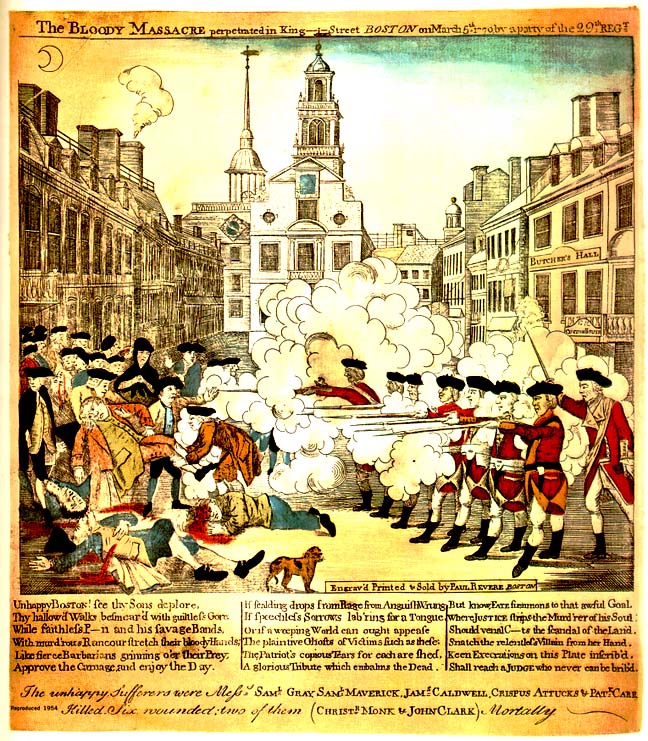Boston, on 5 March 1770, was the scene of an ugly incident. Having the King’s troops stationed in the city to ensure Bostonians followed Parliament’s edicts created a constant tension. The presence of those troops made citizens feel as if they were being treated like traitors to the Crown.
Some of those troops, poorly paid, were looking for part-time work, which only increased the tension, as they would take jobs away from the locals. Clashes between soldiers and citizens were becoming more common.
On this night, a single sentry was set upon by an angry crowd. That brought out more soldiers to face the crowd. Snowballs, sticks, and stones were thrown at the soldiers. In the confusion, some of the soldiers thought they heard their captain shouting to shoot; in fact, he was saying just the opposite.
Thinking they had heard the “fire” order, they shot into the crowd, resulting in five deaths.
All of Boston was in an uproar over this incident. Paul Revere quickly published what has become a famous engraving.
The problem with this depiction is that it made it seem like an orchestrated action by the soldiers. It only made the situation worse.
Those soldiers had to go on trial, but who among the Boston lawyers would take on their case? Who was willing to face the storm of criticism by defending them?
Two lawyers undertook the task: John Adams and Josiah Quincy. Adams took the lead and, although he was a patriot who objected to the Parliament’s actions, he knew the soldiers deserved a fair trial.
Adams worked hard for his clients. He successfully got the captain acquitted of all wrongdoing; only two of the soldiers were convicted, but not for willful murder. They were punished and sent back to England, but their lives were spared.
 John Adams knew that the truth had to come out, regardless of the position he took on political matters. One of his comments from these trials has come down to us today, used by many people in all kinds of situations, mainly because it is applicable across the board. Adams said,
John Adams knew that the truth had to come out, regardless of the position he took on political matters. One of his comments from these trials has come down to us today, used by many people in all kinds of situations, mainly because it is applicable across the board. Adams said,
Facts are stubborn things; and whatever may be our wishes, our inclinations, or the dictates of our passion, they cannot alter the state of facts and evidence.
What was exhibited here? Integrity. John Adams had that quality, and he proved that fairness could be achieved even in an emotional and tension-packed situation.
Later in life, Adams pointed to his defense of those soldiers as his most honorable act. I would have to agree. May we learn from his example.

